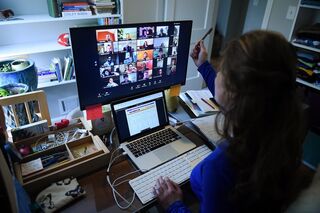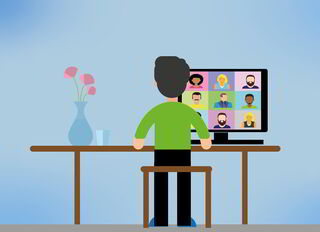Social Learning Theory
3 Ways That School Closures Hurt Social Learning in Kids
Important life lessons are learned through concrete interaction with peers.
Posted August 15, 2020 Reviewed by Devon Frye

The current discussion about whether and when to reopen schools glosses over the particular needs of children aged 2 to 5 who would typically be enrolled in daycare, preschool, or pre-k.
Kids Learn Social Skills Together
During these early years, youngsters learn basic social skills—how to read others, empathize, take turns, convey their needs, settle conflicts, and persuade.
Important life lessons are learned through concrete interaction with peers, not just siblings and parents, and certainly not through Zoom screens. From the brain’s perspective, these kinds of hands-on lessons must be mastered during a narrow developmental window that closes around age 5.
Take the roiling growth within the neonatal brain that is busy creating two million synapses per second, an excess which is subsequently pruned away by the use-it-or-lose-it principle. During the early years, trillions of connection pathways are laid down every 24 hours, and social engagement—otherwise known as play in this age group—helps develop and physically shape a young person’s brain. Physical activity and play-based games with ordinary objects as simple as a cardboard box are part of this phase and also help develop fine motor skills.
Infants start learning to read others before they learn to speak. Hands-on learning relies on physical interaction with people and things. It pays off manyfold over the years, and missing out may set young students back.
The Importance of Group Play
Social learning demands that children explore for themselves what it is like to be part of a group. The longstanding German tradition of Kitafahrt outings emphasizes this as they prepare the very young to cope with challenging circumstances. Cellphones and parental contact are strictly verboten during these excursions. “We’ll contact you if we need to,” teachers say.
Over the course of several days, kids as young as 3 rely on newfound friends and their wits to guide them. They sleep under the stars, roast sausages around a campfire, and invent their own games with sticks and stones by the lake. As they explore the forest, they choose their own playmates, settle their own disputes, learn how to ask for help, and begin to develop the lifelong gift of resilience.
France has a similar classe verte, or “green class,” that takes place between the first and fifth grades. It likewise encourages students to learn from hands-on experiences like pottery making, weaving, and exploring the forest rather than relying solely on books or Google. Finland’s version of classe verte is something like kindergarten in the wild with an emphasis on exploratory learning. “The work of a child is to play,” says one Finnish educator, echoing the words of developmental psychologist Jean Piaget, “when they are moving their brains work better.”
Schoolwork for the young consists largely of playing together in scenarios that call upon imagination, pretending, and what-if games such as “restaurant,” “grocery store,” “packing for a trip,” or “fashion show.” The American Academy of Pediatrics agreed in its 2018 report, writing: “The importance of playful learning for children cannot be overemphasized.”
Unlike in the world of The Matrix films, we cannot jack in and instantly download knowledge that would otherwise take years to attain. Learning takes time and physical engagement—pencil to paper and not merely swiping and typing. The renowned Gesell Institute for Human Development reconfirmed that the stages of childhood development have not changed in the 60 years the organization has been monitoring them.
We Still Have a Stone Age Brain
The world has sped up tremendously, but our brains are not that much different from those of our distant cave ancestors. The Stone Age brain is at home in an environment where it gets to engage its natural inclination to socialize, especially during the early years when the bulk of brain plasticity takes place.

We have had evidence for decades that kids younger than 3 years old don't learn from TV as well as they do from one-on-one engagement. Studies involving families in which the TV is always on find a language delay in the young members of the household.
Screens don’t teach kids, teachers do. And when they realize they aren’t being watched, they are apt to zone out. What virtual schooling offers isn’t anywhere close to the kind of intimate, back-and-forth exchange that happens between student and teacher.
That’s the price of school closures, and it’s a price beyond economics.
Please email comments via the Author Profile, where you can also ask for copies of articles and papers.




